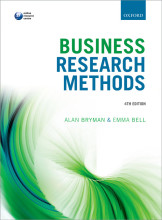Summary: Business Research Methods | 9780199668649 | Alan Bryman, et al
- This + 400k other summaries
- A unique study and practice tool
- Never study anything twice again
- Get the grades you hope for
- 100% sure, 100% understanding
Read the summary and the most important questions on Business Research Methods | 9780199668649 | Alan Bryman; Emma Bell
-
1 The nature and the process of business research methods
This is a preview. There are 1 more flashcards available for chapter 1
Show more cards here -
Why is it important to understand business research methods?
1. Help you avoid the many pitfalls.
2. Point of view of a consumer of published article.
3. Satisfy your curiosity -
1.3 Business research methods in context
-
What parts take place of the context within which business research take place?
- Theories
- Existing knowledge -
What are some influences on the research process?
- Epistemological
- Ontological
- Quality criteria
- Values
- Political context
- Trainings and personal values -
1.4 Relevance to practice
This is a preview. There are 1 more flashcards available for chapter 1.4
Show more cards here -
What are four sources of information that contribute to evidence-based management?
1. Practioner expertise and judgement
2. Evidence from the local context
3. Critical evaluation of the best available research evidence
4. Perspectives of those who may be affected by a particular decision. -
What are the distinctive categories in process of knowledge production?
MODE 1: driven by academic agenda. Build upon existing knowledge and applied knowledge. Little emphasis on knowledge distribution.
MODE 2: role of transdisciplinary. Findings are closely related to context and may be hard to replicate. Knowledge is distributed more rapidly. -
1.5 The process of business research
-
What are the main elements of business research?
Literature review
concepts and theories
research questions
sampling
data analysis
writing up -
1.6 The messiness of business research
-
What is important in business research because of its messiness?
Be flexible and open to modify and adapt research plans in response to opportunities and problems that arise. -
2 Business research strategies
-
What is the difference between epistemoligcal and ontological issues?
E: how can we examine the reality. What is regarded as appropriate knowledge about the social world
O: concerns the nature of social entities -
2.1 Theory and research
This is a preview. There are 6 more flashcards available for chapter 2.1
Show more cards here -
What are the two types of theories?
Grand theories
•offer few indications to influence the collection of empirical evidence
•do not necessarily link well with the real world
•are said to be of limited use in connection with social research
•do not typically guide management and business research
•Structural-functionalism, Symbolic Interactionism
•Theories of the middle range
•operate in limited domains
•vary in purpose or application
•fall somewhere between grand theories and empirical findings
•represent attempts to understand and explain limited aspects of social life -
What are examples of grand and middle range theories?
Grand theories: Maslow
Middle range theories: labour process management and contingency theory.
- Higher grades + faster learning
- Never study anything twice
- 100% sure, 100% understanding
Topics related to Summary: Business Research Methods
-
Business research strategies - Theory and research
-
Research designs - Quality criteria in business research
-
The nature of qualitative research
-
Sampling in Qualitative research - Purposive sampling
-
Ethnography and participant observation - Roles for ethnographers
-
Language in qualitative research
-
Qualitative data analysis - General strategies of qualitative data analysis
-
Writing up - Reflexivity
































